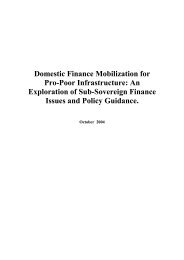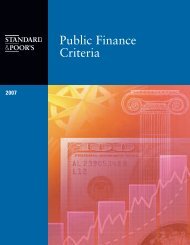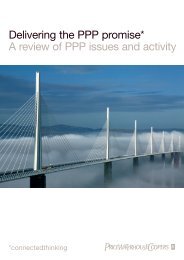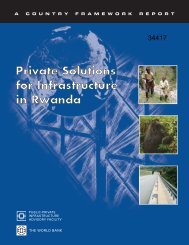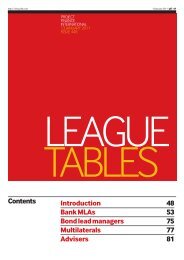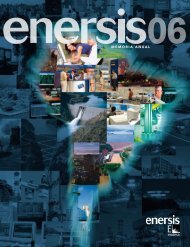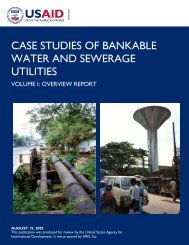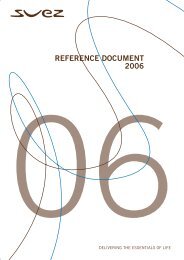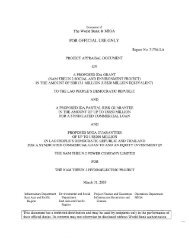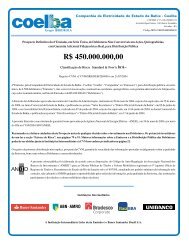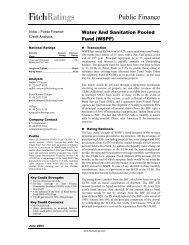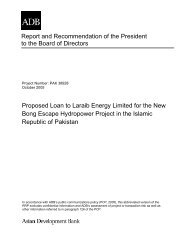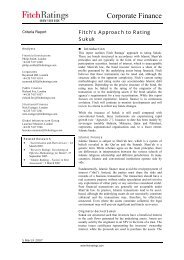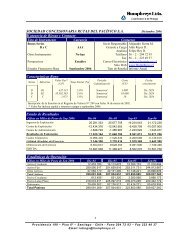EAP - The Pacific Infrastructure Challenge - World Bank (2006).pdf
EAP - The Pacific Infrastructure Challenge - World Bank (2006).pdf
EAP - The Pacific Infrastructure Challenge - World Bank (2006).pdf
Create successful ePaper yourself
Turn your PDF publications into a flip-book with our unique Google optimized e-Paper software.
<strong>The</strong> predominance of oil fired electricity generation – mostly diesel – exposes the <strong>Pacific</strong><br />
countries to the vagaries of the international oil market. Large variations exist between<br />
wholesale and retail prices of fuel in various <strong>Pacific</strong> countries. <strong>The</strong>se go beyond the simple<br />
explanation of ‘small and remote markets’. For example: large volume markets in Papua New<br />
Guinea and New Caledonia have consistently reported up to 50% higher pre-tax wholesale<br />
prices than much smaller markets.<br />
Analysis of the pre-tax wholesale price of fuel (mogas, diesel and kerosene) for three periods<br />
in 2003 showed that there is a substantial and systematic fuel price premium, above that<br />
charged by efficient fuel suppliers to a reasonably efficient small, remote market, being<br />
extracted from the <strong>Pacific</strong> region. <strong>The</strong> aggregate value of this premium is calculated as being<br />
in excess of US$120 million annually.<br />
In the <strong>Pacific</strong>:<br />
Up to 80% of the costs of island utilities can be attributed to fuel costs and outer<br />
island fuel costs can be 200 – 400% higher than that of main islands<br />
Exclusive ownership of fuel import terminals by multi-national oil companies<br />
(MNOCs) results in higher fuel prices, whether they operate as monopolies or not<br />
MNOCs use fuel terminal ownership and the resulting barrier to entry for new<br />
suppliers to extract high returns from <strong>Pacific</strong> countries. <strong>The</strong>y therefore have no<br />
incentive to enter price competition with small islands<br />
Periodic international tendering of fuel supply (made possible by independent or<br />
government ownership of at least one import fuel terminal) is an effective form of<br />
competition between MNOCs<br />
Fuel prices can be influenced by institutional arrangements. Data collected and reported bimonthly<br />
over a period of 2 years demonstrated that the pre-tax wholesale price of fuel in<br />
countries such as Vanuatu and Kiribati (which have no price regulation and ‘closed market’<br />
monopoly suppliers respectively) are consistently as much as 100% higher than those found<br />
in Samoa or the Solomon Islands, which have an open market international tendering<br />
process and price regulation.<br />
Of the 11 <strong>Pacific</strong> countries reviewed, only Samoa has a national supply contract with a<br />
MNOC. It also has its own fuel terminal and can therefore change suppliers if it chooses. As<br />
such, Samoa has negotiated a favorable supply contract by sourcing the country’s total<br />
supply from one oil company. This benefit is reflected in diesel and petrol prices which are<br />
amongst the lowest in the <strong>Pacific</strong> region, before government taxes and levies are imposed.<br />
<strong>The</strong> Marshalls Energy Company owns its own fuel terminal and can therefore purchase fuel<br />
directly from MNOC suppliers. This contributes towards lower overall fuel prices. However,<br />
the Marshalls Energy Company does not supply fuel nationally.<br />
Economies of Scale<br />
<strong>The</strong> generation cost of electricity should benefit from economies of scale. Figure A11 sets<br />
out the relationship between average end user tariffs 42 and electricity production for most<br />
<strong>Pacific</strong> and comparator countries. It seems that size does have an impact on cost, but it is far<br />
from the most important factor.<br />
42 It would be better to use cost rather than tariff in this analysis, but that data was not available<br />
93



